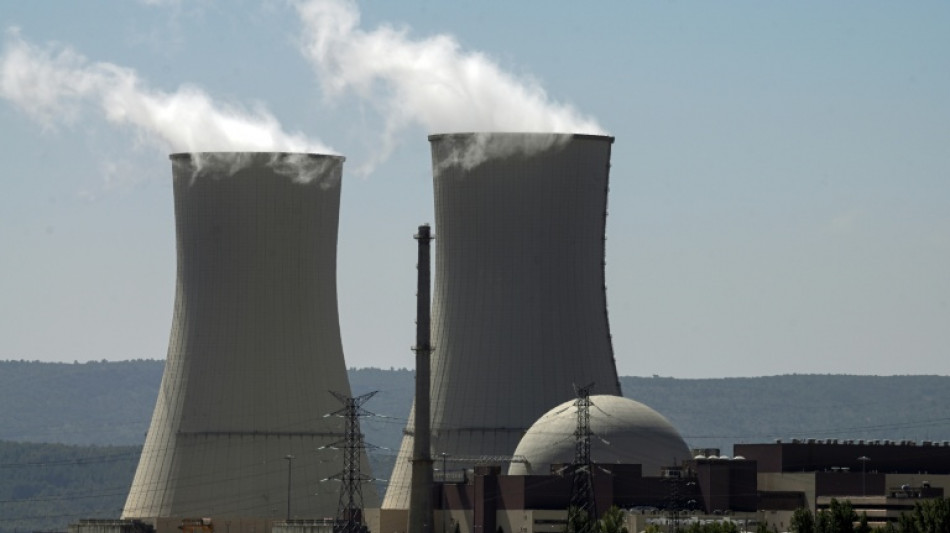
-
 Rare blue diamond fetches $21.5 mn at auction in Geneva
Rare blue diamond fetches $21.5 mn at auction in Geneva
-
Stock markets fluctuate as China-US trade euphoria fades

-
 Ousted Myanmar envoy charged with trespass in London residence row
Ousted Myanmar envoy charged with trespass in London residence row
-
Russia jails prominent vote monitor for five years

-
 Umbro owner in joint bid for Le Coq Sportif
Umbro owner in joint bid for Le Coq Sportif
-
Tom Cruise has world guessing as he unleashes 'Mission: Impossible' at Cannes

-
 China's Tencent posts forecast-beating Q1 revenue on gaming growth
China's Tencent posts forecast-beating Q1 revenue on gaming growth
-
Trump presses Syria leader on Israel relations after lifting sanctions

-
 FA appoint former Man Utd sporting director Dan Ashworth as chief football officer
FA appoint former Man Utd sporting director Dan Ashworth as chief football officer
-
Stop holding opponents incommunicado, UN experts tell Venezuela

-
 Indonesian filmmakers aim to impress at Cannes
Indonesian filmmakers aim to impress at Cannes
-
Trump presses Syria leader on Israel after lifting sanctions

-
 French PM to testify on child abuse scandal
French PM to testify on child abuse scandal
-
Players stuck in middle with IPL, national teams on collision course

-
 Peru PM quits ahead of no-confidence vote
Peru PM quits ahead of no-confidence vote
-
Strikes kill 29 in Gaza as hostage release talks ongoing

-
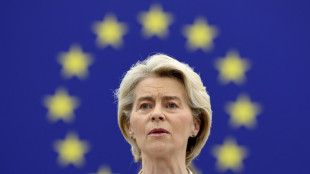 Court raps Brussels for lack of transparency on von der Leyen vaccine texts
Court raps Brussels for lack of transparency on von der Leyen vaccine texts
-
France summons cryptocurrency businesses after kidnappings

-
 Pakistan returns Indian border guard captured after Kashmir attack
Pakistan returns Indian border guard captured after Kashmir attack
-
Baidu plans self-driving taxi tests in Europe this year
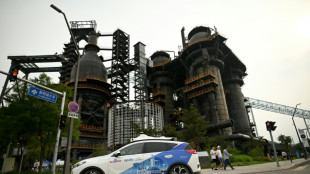
-
 Trump meets new Syria leader after lifting sanctions
Trump meets new Syria leader after lifting sanctions
-
Equity markets swing as China-US trade euphoria fades

-
 Burberry warns 1,700 jobs at risk after annual loss
Burberry warns 1,700 jobs at risk after annual loss
-
Trump to meet new Syrian leader after offering sanctions relief

-
 'Children are innocent': Myanmar families in grief after school air strike
'Children are innocent': Myanmar families in grief after school air strike
-
Colombia joins Belt and Road initiative as China courts Latin America
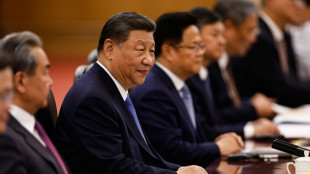
-
 Australian champion cyclist Dennis gets suspended sentence after wife's road death
Australian champion cyclist Dennis gets suspended sentence after wife's road death
-
Protection racket? Asian semiconductor giants fear looming tariffs

-
 S. Korea Starbucks in a froth over presidential candidates names
S. Korea Starbucks in a froth over presidential candidates names
-
NATO hatches deal on higher spending to keep Trump happy
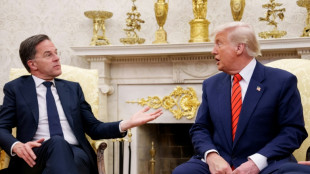
-
 Eurovision stage a dynamic 3D 'playground': producer
Eurovision stage a dynamic 3D 'playground': producer
-
Cruise unleashes 'Mission: Impossible' juggernaut at Cannes

-
 Suaalii in race to be fit for Lions Tests after fracturing jaw
Suaalii in race to be fit for Lions Tests after fracturing jaw
-
Pacers oust top-seeded Cavs, Nuggets on brink

-
 Sony girds for US tariffs after record annual net profit
Sony girds for US tariffs after record annual net profit
-
China, US slash sweeping tariffs in trade war climbdown

-
 Human Rights Watch warns of migrant worker deaths in 2034 World Cup host Saudi Arabia
Human Rights Watch warns of migrant worker deaths in 2034 World Cup host Saudi Arabia
-
Sony logs 18% annual net profit jump, forecast cautious

-
 China, US to lift sweeping tariffs in trade war climbdown
China, US to lift sweeping tariffs in trade war climbdown
-
Asian markets swing as China-US trade euphoria fades

-
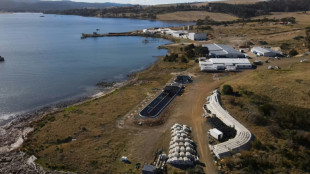 Australian seaweed farm tackles burps to help climate
Australian seaweed farm tackles burps to help climate
-
Judgment day in EU chief's Covid vaccine texts case
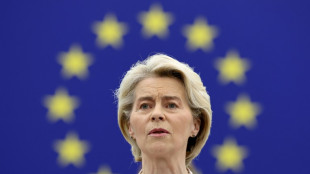
-
 Trump set to meet Syrian leader ahead of Qatar visit
Trump set to meet Syrian leader ahead of Qatar visit
-
Misinformation clouds Sean Combs's sex trafficking trial

-
 'Panic and paralysis': US firms fret despite China tariff reprieve
'Panic and paralysis': US firms fret despite China tariff reprieve
-
Menendez brothers resentenced, parole now possible

-
 'Humiliated': Combs's ex Cassie gives searing testimony of abuse
'Humiliated': Combs's ex Cassie gives searing testimony of abuse
-
Latin America mourns world's 'poorest president' Mujica, dead at 89

-
 Masters champion McIlroy to headline Australian Open
Masters champion McIlroy to headline Australian Open
-
Sean Combs's ex Cassie says he coerced her into 'disgusting' sex ordeals


Spain under pressure to abort nuclear energy phase-out
Spain, a European renewable energy leader, is coming under increasing pressure from the right and business groups to reverse its plans to phase out its nuclear power plants by 2035.
At the height of enthusiasm for nuclear power in the 1980s, Spain had eight nuclear plants providing 38 percent of its electricity. Now it has five, providing 20 percent of its power.
Under the country's nuclear phase-out plans, agreed in 2019 under the government of Socialist Prime Minister Pedro Sanchez, these remaining plants will be closed over the next decade, as the country focuses instead on green energy sources such as solar and wind power.
But as the planned closure of the country's oldest and most powerful atomic plant at Almaraz in western Spain in 2027-28 approaches, calls are growing for Spain to follow in the footsteps of other European countries that are reviving their nuclear power.
The two reactors at Almaraz generate around seven percent of the total electricity produced in the European Union's fourth-largest economy.
Spain's decision to close its plants "was adopted in a completely different industrial, geopolitical, social and economic context" and no longer makes sense without "a viable alternative," the Nuclear Forum lobby group that represents the sector said in a statement.
Atomic power will be needed to meet Spain's electricity needs as demand will soar due to growing sales of electric vehicles and the expansion of data centres to accommodate the greater use of AI, it added.
- 'Absolutely necessary' -
Ignacio Sanchez Galan, the chairman of Spanish energy company Iberdrola, which operates several atomic power plants as well as renewable energy farms, said nuclear energy is "absolutely necessary" to keep the lights on.
Iberdrola is one of around 30 companies that signed a manifesto last month calling for the extension of Spain's nuclear power plants.
"Dismantling this infrastructure prematurely would cause irreparable economic and social damage," the manifesto said.
Since gas prices spiked with the Ukraine war, global interest in the nuclear sector is at its highest since the oil crises in the 1970s, according to the International Energy Agency.
The Netherlands and Sweden are planning to build new nuclear plants, while Belgium's new conservative-led government has reversed a two-decade pledge to phase out atomic power.
Italy's cabinet last month opened the door to a return to nuclear power, 25 years after the closure of its last reactors.
- 'Not ready' -
Spain's conservative main opposition People's Party (PP) has added to the pressure.
It has tabled a motion, which has been approved by the parliament, calling on the government to keep the nuclear plants in operation.
During a visit to the Almaraz plant last month, the influential PP head of Madrid's regional government, Isabel Diaz Ayuso, said the measure was necessary to "protect jobs and energy sovereignty" and warned that Spain was "not ready to replace nuclear energy".
The price of electricity in Spain could rise by 23 percent for domestic consumers and by 35 percent for businesses if the country's nuclear reactors are shut down, according to a study by PwC.
Abandoning nuclear power is a "big change" because it means replacing a "constant and predictable energy supply" with "more volatile" sources such as solar and wind, Enric Bartlett, a professor of environmental law at Esade Law School, told AFP.
But it should be possible to close the remaining nuclear plants "without disruption" if Spain has the right amount of installed capacity to generate electricity by other means by 2035, and the "appropriate transport and storage networks", he added.
"There will have to be a significant increase in investment," Bartlett said.
L.Maurer--VB
